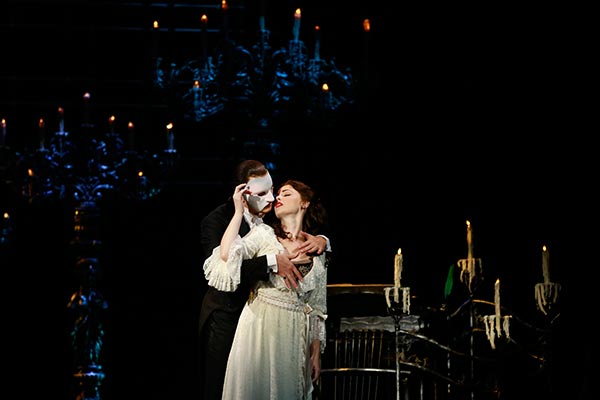
The Phantom of the Opera, a hit musical by Andrew Lloyd Webber, staged its first show in Guangzhou city in Guangdong province on Sept 22. The southern Chinese city is the second location on the mainland, after Shanghai, to host the show that is scheduled to be staged in Beijing in November.
The Guangzhou Opera House has a giant chandelier and takes the look of 19th-century Paris while hosting the musical that is being staged through Sunday.
The investment on the show in the two Chinese cities cost 90 million yuan ($14 million), a record for the country's market for musicals, according to Tian Yuan, general manager of Beijing-based One World Culture Communications, a subsidiary of China Arts and Entertainment Group that organized the tour.
"The Chinese market for musicals has grown a lot in the past 10 years, which is part of the reason why we dared to introduce such an expensive production," Tian says. "Theaters have also sprung up across the country with heavy investments from the government."
The Phantom of the Opera is regarded as "the diamond on the crown" of Webber's musicals, Tian says. It debuted in London's West End in 1986 and has been staged more than 74,000 times in 27 countries, attracting at least 130 million viewers, before coming to Guangzhou.
"The show is magic. I mean that both literally and in terms of the emotional involvement of the audience while watching the incredible story," says Philip Godawa, the musical's director.
And, it isn't far-fetched. The stage setting, for instance, suddenly changes from the dressing room for Christine, the musical's heroine, to a subterranean "lake" enshrouded in mist.
Six large candelabrums rise from the stage floor, making for strong visual effects. The Phantom and Christine sail across the lake on a boat to his lair beneath the opera house.
It took 22 days to assemble the complex stage at Guangzhou Opera House with 23 containers of props and clothes. The stage floor with 150 "secret" doors was specially made and delivered to Guangzhou by air.
Shanghai Grand Theater was the only theater that Really Useful Group, the producer of The Phantom of the Opera, could find in China to meet the demands of stage setting when the musical made its mainland debut in 2004, Tian says.
The musical returned to Shanghai in 2013, and chose Guangzhou Opera House this year as it was willing to modify its stage for the show, while the newly built Beijing Tianqiao Performing Arts Center seemed like another good venue as the country's only theater designed for musicals.
Challenges remain
But China's musical industry is short on facilities and talent, including performers, technicians and producers, according to Tian.
Her company and Really Useful Group had planned to coproduce the Chinese version of The Phantom of the Opera after the success of the Chinese version of Cats in 2012.
"I found it difficult to find Chinese actors and actresses who were skillful enough to handle the long, difficult arias and were dedicated enough to stay energetic and expressive while performing eight shows a week," Tian says.
In one scene from the musical, Christine hits a high note when singing with Phantom. It is said that Webber wrote the challenging aria to showcase the great voice of Sarah Brightman, his wife at the time, who played the soprano in the original cast.
It set the bar high for all other actresses to be cast as Christine.
The Phantom, the center of the drama, is an especially demanding role. But Brad Little, an American musical theater actor who has played the role over and over again, blew away audiences in Guangzhou on the first night with his performance.
"The characters in the story speak internationally and speak to the human heart," Little says.
Lin Jun, 25, is one of the musical's fans. She first watched the show in London, then followed it to Hong Kong and finally had the opportunity to watch it in Guangzhou, her hometown.
"I always get new feelings each time I watch it," says Lin, who is a local TV reporter.
"The production staged in Guangzhou was as good as those I watched in London and Hong Kong. I was surprised that the musical was so popular in Guangzhou on its first visit to the city."
Awaiting growth
Yet, it's too early to say that we have a mature market for musicals in China, says Tian.
"The rental of a venue is astonishingly high in the eye of foreign producers. So is the media campaign."
It is lucky for Tian's company to have built a partnership with Beijing Hyundai, a Sino-South Korean joint automaker, which has been sponsoring the musicals.
But Tian hopes that more enterprises can join in to support the development of the industry.
"Only a few enterprises in China would like to sponsor musicals because many see little commercial value in them," she says.
The high rents, expensive media campaigns and insufficient sponsorship have a bearing on tickets, making them costlier in China than in many other countries.
But there are also Chinese who may have the money to spend, but may not want to spend it on such experiences, she says.
Tian's company and Tmall.com co-launched a ticket sales promotion of The Phantom of the Opera on the online shopping site in September, targeting higher-income customers. But the attempt didn't generate large sales.
Tian's company has produced the Chinese versions of classics like Mamma Mia! and Cats, staged adaptations of South Korean musicals and has produced original Chinese musicals.
"The industry for musicals is highly competitive," Tian says.
"We cherish the aspiration ... but the profession and the market (in China) have yet to develop properly.
"It requires long-term efforts to cultivate a mature market for musicals, which can't be achieved by the success of just one show," Tian says, adding that she plans to bring the musical Les Miserables to China next year.





